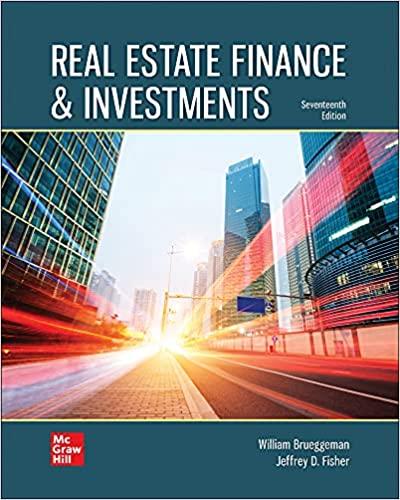Question
QUESTION 1 1. A call provision grants the bond issuer the: option of repurchasing the bonds prior to maturity at a prespecified price. option to
QUESTION 1
1. A call provision grants the bond issuer the:
| option of repurchasing the bonds prior to maturity at a prespecified price. | ||
| option to exchange the bonds for equity securities. | ||
| right to repurchase the bonds on the open market prior to maturity. | ||
| right to automatically extend the bond's maturity date. | ||
| right to contact each bondholder to determine if he or she would like to extend the term of his or her bonds. |
QUESTION 2
1. A corporate bond pays 6.65 percent interest. How much would a municipal bond have to pay to be equivalent to this on an after tax basis if you are in the 25 marginal percent tax bracket?
| 6.28 percent | ||
| 4.99 percent | ||
| 8.31 percent | ||
| 8.87 percent | ||
| 7.75 percent |
QUESTION 3
1. A registered-form bond is defined as a bond that:
| is a bearer bond. | ||
| is unsecured. | ||
| pays coupon payments directly to the owner of record. | ||
| is listed with the Securities and Exchange Commission (SEC). | ||
| is held in street name. |
QUESTION 4
1. Arts and Crafts Warehouse wants to issue 15-year, zero-coupon bonds that yield 7.5 percent. What price should it charge for these bonds if the face value is $1,000? Assume semiannual compounding.
| $362.14 | ||
| $331.40 | ||
| $308.15 | ||
| $356.08 | ||
| $369.94 |
QUESTION 5
1. Dividends are:
| only partially taxable to high-income individual shareholders. | ||
| paid out of aftertax profits. | ||
| payable at the discretion of a firm's president. | ||
| treated as a tax-deductible expense of the issuing firm. | ||
| paid only to preferred stockholders. |
QUESTION 6
1. Generally speaking, bonds issued in the U.S. pay interest on a(n) ________ basis.
| quarterly | ||
| monthly | ||
| annual | ||
| daily | ||
| semiannual |
QUESTION 7
1. Kate could not attend the last shareholders' meeting and thus she granted the authority to vote on her behalf to the managers of the firm. Which term applies to this granting of authority?
| Straight | ||
| In absentia | ||
| Cumulative | ||
| Consent-form | ||
| Proxy |
QUESTION 8
1. Newly issued securities are sold to investors in which one of the following markets?
| Primary | ||
| Secondary | ||
| Proxy | ||
| Inside | ||
| Stated value |
QUESTION 9
1. On which one of the following dates do dividends become a liability of the issuer for accounting purposes?
| Twelve months prior to the expected dividend payment date | ||
| First day of the fiscal year in which the dividend is expected to be paid | ||
| On the date the board declares the dividend | ||
| On the date of payment | ||
| On the date the company announces the dividend to the public |
QUESTION 10
1. The Treasury yield curve plots the yields on Treasury notes and bonds relative to the ________ of those securities.
| maturity | ||
| market price | ||
| coupon rate | ||
| issue date | ||
| face value |
QUESTION 11
1. The market-required rate of return on a bond that is held for its entire life is called the:
| call premium. | ||
| yield to maturity. | ||
| coupon rate. | ||
| current yield. | ||
| dirty yield. |
QUESTION 12
1. The written agreement that contains the specific details related to a bond issue is called the bond:
| issue paper. | ||
| indenture. | ||
| debenture. | ||
| registration statement. | ||
| document. |
QUESTION 13
1. This morning, Jeff found an aged bond certificate lying on the street. He picked it up and noticed that it was a 50-year bond that matured today. He presented the bond to the bank teller at his local bank and received payment for both the entire principal and the final interest payment. The bond that Jeff found must have been which one of the following?
| Callable bond | ||
| Registered-form bond | ||
| Debenture | ||
| Note | ||
| Bearer-form bond |
QUESTION 14
1. What is the principal amount of a bond that is repaid at the end of the loan term called?
| Face value | ||
| Market price | ||
| Dirty price | ||
| Accrued price | ||
| Coupon |
QUESTION 15
1. Which one of the following terms applies to a bond that initially sells at a deep discount and only makes one payment to bondholders?
| Income | ||
| Tax-free | ||
| Convertible | ||
| Zero coupon | ||
| Callable |
QUESTION 16
1. Which one of the following types of securities has the lowest priority in a bankruptcy proceeding?
| Common stock | ||
| Preferred stock | ||
| Convertible bond | ||
| Straight bond | ||
| Senior debt |
Step by Step Solution
There are 3 Steps involved in it
Step: 1

Get Instant Access to Expert-Tailored Solutions
See step-by-step solutions with expert insights and AI powered tools for academic success
Step: 2

Step: 3

Ace Your Homework with AI
Get the answers you need in no time with our AI-driven, step-by-step assistance
Get Started


